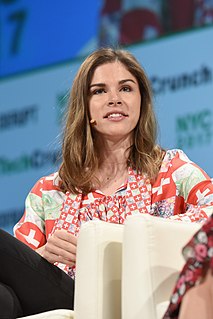A Quote by Steve Jobs
Many companies forget what it means to make great products. After initial success, sales and marketing people take over and the product people eventually make their way out.
Related Quotes
Over the past 60 years, marketing has moved from being product-centric (Marketing 1.0) to being consumer-centric (Marketing 2.0). Today we see marketing as transforming once again in response to the new dynamics in the environment. We see companies expanding their focus from products to consumers to humankind issues. Marketing 3.0 is the stage when companies shift from consumer-centricity to human-centricity and where profitability is balanced with corporate responsibility.
When the functionality of a product or service overshoots what customers can use, it changes the way companies have to compete. When the product isn't yet good enough, the way you compete is by making better products. In order to make better products, the architecture of the product has to be interdependent and proprietary in character.
Traditional sales and marketing involves increasing market shares, which means selling as much of your product as you can to as many customers as possible. One-to-one marketing involves driving for a share of customer, which means ensuring that each individual customer who buys your product buys more product, buys only your brand, and is happy using your product instead of another to solve his problem. The true, current value of any one customer is a function of the customer's future purchases, across all the product lines, brands, and services offered by you.
One thing the humanitarian world doesn't do well is marketing. As a journalist, I get pitched every day by companies that have new products. Meanwhile, you have issues like clean water, literacy for girls, female empowerment. People flinch at the idea of marketing these because marketing sounds like something only companies do.
We weren’t trying to strike it rich with Firefox. It’s open source and it’s free. We weren’t trying to take over the world; we had kind of modest goals, and it was OK if it failed. We were a lot freer to make risky decisions. If you can afford to do things that way, it’s just so much better. You’re not thinking about venture capitalists or marketing or sales. Just product and users, all day every day.
I see "demand creation" as a 20th-century construct that's bound up with advertising. It's an outmoded view of marketing that says, "First, we build a product or service, then we advertise it into people's lives." Embedded this view is the belief that companies control brands. This is a myth. My message all along has been that brands are actually created by customers, not companies. Companies only provide the raw materials - the products, messaging, behaviors - that people use these to create brands.
Often in companies, you'll see tensions between sales and marketing. Sales people will want to give discounts to clients because they often get paid a commission based on how much they sell. So they're always pushing to give discounts because that will increase sales. Marketing, however, is judged by overall profitability.
You can build the most important companies in history with a very simple to describe concept. You can market products in less than 50 characters. There is no reason why you can't build your company the same way. So force yourself to simplify every initiative, every product, every marketing, everything you do. Basically take out that red and start eliminating stuff.



































